“ZAi FX!” had been reviewing the article written by Masahiro Hidaka, Bloomberg, which shook up the financial market, in a series of four articles as follows.
[Reference articles]
(1) Uncover the Mystery of the Article Written by Masahiro Hidaka, Bloomberg, Which Rattled the Market! (Japanese)
(2) Is He “Anti-Kuroda”? Was the Article by Masahiro Hidaka Based on Leaked Information? (Japanese)
The following article is an abridged edition of (4) above, mainly focusing on the English edition of the article written by Masahiro Hidaka.
The decision made on April 28, 2016, by the Bank of Japan to postpone further easing brought a deep sense of disappointment to the market. Stock prices plunged and the yen surged following the announcement.
However, such an intense response may probably not have been caused solely by the announcement of the BOJ. It is possible that expectations towards additional easing swelled prior to the announcement, with the Bloomberg article “BOJ Officials Are Said to Eye Possible Negative Rate on Loans” by Masahiro Hidaka published on April 22, and that the market reacted severely partly as a backlash. With this hypothesis in mind, “ZAi FX!” has been reviewing some questions involving the article.
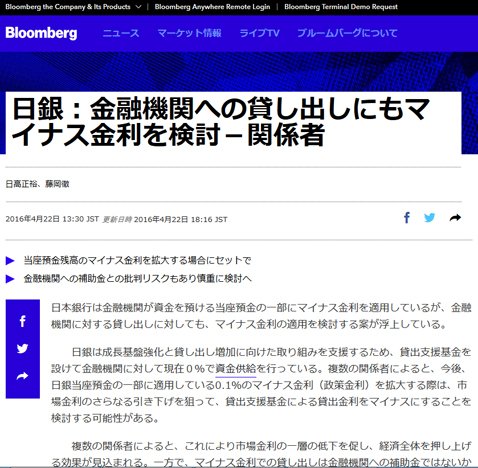
The article in question was also published in English. In terms of the impact it had on the market, maybe the English edition is more important. However, there is something strange about this English article.
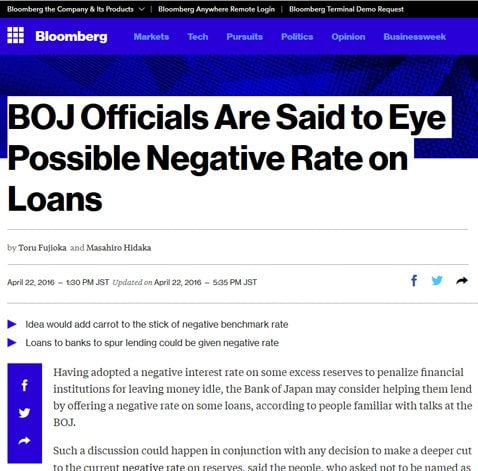
Here, I would like to examine this English edition of the article.
Will the information source include “BOJ watchers”?
In the original Japanese article, “persons involved (kankei-sha)” is mentioned twice. While the structure of the English article is slightly different from the Japanese edition, it also mentions the persons involved more than once. However, different expressions are used to describe these “persons involved.” While it is expressed as “the officials said” in one place, it appears in another place as “according to people familiar with talks at the BOJ.” Is it possible that these two expressions signify virtually the same thing? Won’t the latter expression give an impression pretty different from “people who belong to the BOJ”?
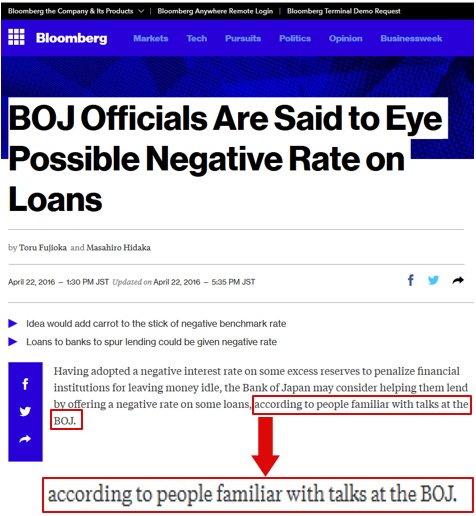
To make sure, “ZAi FX!” asked two Japanese individuals, who have long experience using English in their daily lives and are used to reading finance-related news on a regular basis, whether the impressions the two expressions give are the same or not.
Both of them answered that these two expressions are clearly distinguished from one another.
They explain that while “BOJ officials” refers to those within the organization of the BOJ, “people familiar with talks at the BOJ” includes the so-called “BOJ watchers,” who continuously pay close attention to the movement of the BOJ and the remarks of its personnel.
There is only one expert whose comment appeared in the article in question by Mr. Hidaka from the time it was published: Ryutaro Kouno, the chief economist at BNP Paribas SA. Mr. Kouno is also one of the “BOJ watchers.”
In other words, Mr. Kouno is included in the “people familiar with talks at the BOJ.” Speaking hypothetically, even if Mr. Hidaka had written the article in question based on the story he heard from Mr. Kouno, there is nothing wrong with the article as far as the part which expressed “people familiar with talks at the BOJ” (again, this is just hypothetically speaking).
Was the title revised?
In addition, what looks most odd about the English edition of this article in question is its title. I might say the biggest problem concerning Hidaka’s article is here, in this title.

The title mentioned at the beginning, “BOJ Officials Are Said to Eye Possible Negative Rate on Loans,” is the title I can currently find on the Bloomberg website.
I would first like to point out in the context of the question I presented above that the term “BOJ Officials” is clearly stated in this title. It is solely in this title where this expression, which clearly refers to those within the organization of the BOJ, is used, both in the Japanese and English editions.
Now, what is strange about the title of the English article is that it seems to have been revised after the article was first published.
Currently, as you can see, the passive voice “are said to” is used. When confirmed with the Japanese individuals mentioned here before as proficient in English used in this field, they presented several possible interpretations. However, also considering the correspondence with the details of the article, they agreed that this is a rather ambiguous expression, probably meaning that “It is said that the BOJ officials are eyeing a possible negative rate on loans.”
Anyway, at least it is not a direct expression such as “BOJ officials said, ...”
However, through our research on this article, I came across the possibility that one word was added to the title of the article in question afterwards. It is believed that the English edition of this article was first titled “BOJ Officials Said to Eye Possible Negative Rate on Loans.”
There is only one difference with the title that can now be seen on the web: whether the word “are” is present or not.
If this original “BOJ Officials Said...” had been used, it is highly possible that it would be interpreted as the actual words of BOJ officials and not a rumor or hearsay.
Looking at the market movement thereafter, it can be easily imagined that overseas speculators rushed to buy dollars and sell yen, regretting that they have been overly selling dollars against yen and feeling pressed to buy back as early as possible.
Evidence of the alteration of the title
Let us present some of the evidence showing that the title of the English article had been altered.
Just as the Japanese edition of the Bloomberg article had been transmitted via Yahoo! Finance, it seems that Bloomberg articles in English are also transmitted to other websites.
And now, the title of the article that can be seen in “GulfNews” (in Gulf countries) and “BUSINESS TIMES” (in Singapore) does not include “are,” as shown below, but is in the form of “BOJ officials said to ...” It appears that this was the title that was first transmitted.
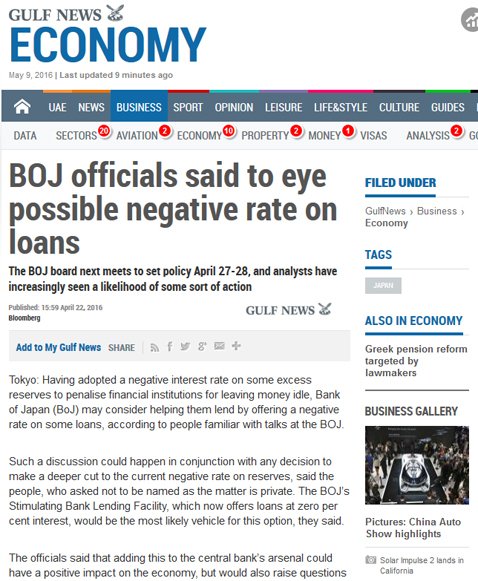
The title of this article is “BOJ officials said to eye possible negative rate on loans,” and does not include the world “are.”
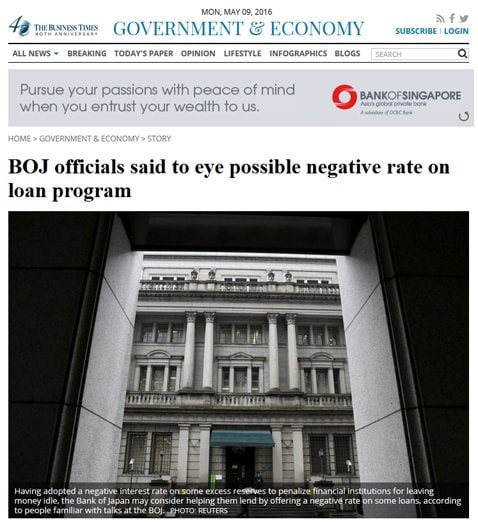
The title of this article is “BOJ officials said to eye possible negative rate on loan program,” and does not include the world “are.” The end is also different, using the term “loan program” instead of just “loans.”
Original title left in the URL
Then, isn’t there any evidence of title alteration left in the original Bloomberg website, or some other place with equivalent credibility? I have searched many places, and finally found out two items of evidence.
One is the URL of the article.
A unique thing about the Bloomberg website is that the URL of an article seems to incorporate the actual title of the article at the time it was published. (However, this may not apply unexceptionally to all cases. I am yet to completely understand the rule.)
What is the URL of the article in question, currently titled “BOJ Officials Are Said to Eye Possible Negative Rate on Loans”? It is as follows.
http://www.bloomberg.com/news/articles/2016-04-22/boj-officials-said-to-eye-possible-negative-rate-on-loan-program
Take a close look at the latter part of the URL:
“boj-officials-said-to-eye-possible-negative-rate-on-loan-program.”
The word “are” is not included here. Therefore, it is inferable that this was the original title when the article was first transmitted.
The original title was left in the cache of Google!
Another trace was left in a corner of Google’s servers. By using a special method of searching as described in detail below, two different article titles, old and new, with the difference of only one word, are shown in the search results (*). (The article URLs shown in the search results were both under the domain of Bloomberg.)
(*Note by the article author: Such search results shown by Google may change over time.)
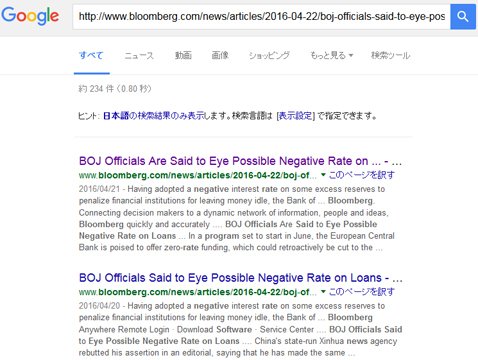
When you click the link, both search results jump to the current Bloomberg page with the new article title. However, there is a thing called cache when using Google. When the Google program called the “crawler” visits a website page, it stores the content at that time as-is on a Google server.
In other words, you can see how the page in question actually looked shortly before by checking the Google cache.
Below is the screen-captured cache.
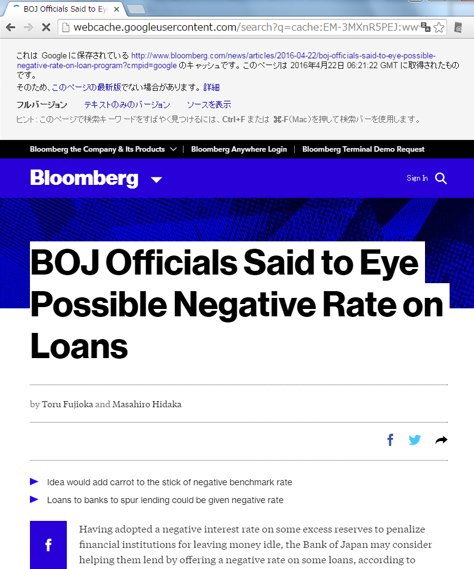
This shows that the original English article title left in the cache of Google is “BOJ officials said to eye possible negative rate on loans,” and does not include “are.”
As can be confirmed from the image, the title of the article in question shown on the Bloomberg site decorated with vivid deep blue does not include the word “are.” It simply says “BOJ Officials Said...”
Previous history of title alteration
Of course, it is not unusual for an online media site to update the title and body text of an article after it is published, such as correcting typos. In fact, that sometimes happens on this “ZAi FX!” site as well. The Bloomberg site even specifies the date and time the article was updated.
I won’t flatly deny the appropriateness of altering the title of an article after its publication.
However, in this case, is it not possible that the article was intentionally titled sensationally as “BOJ Officials Said...,” and then the title was slightly changed thereafter to make it more close to the reality of the process of preparing the article?
Is that too much cynical a guess?
Was it simply a case of correcting a careless mistake?
In fact, it is considered that this is not the first case in which this kind of correction was made. It seems that almost an identical type of correction was made in the past.
In the second article of this series, I have picked up the article by Masahiro Hidaka published on February 12, 2015, titled “BOJ Is Said to See Extra Stimulus Counterproductive for Now.” This is also the title of the English edition that can be currently browsed on the website.
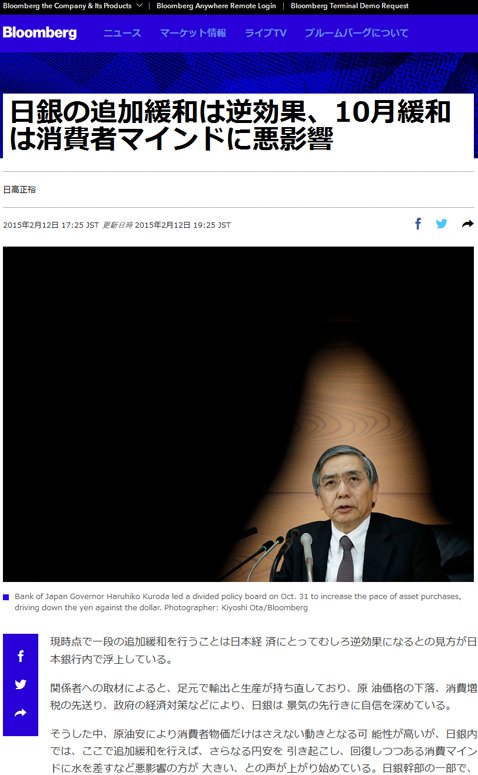
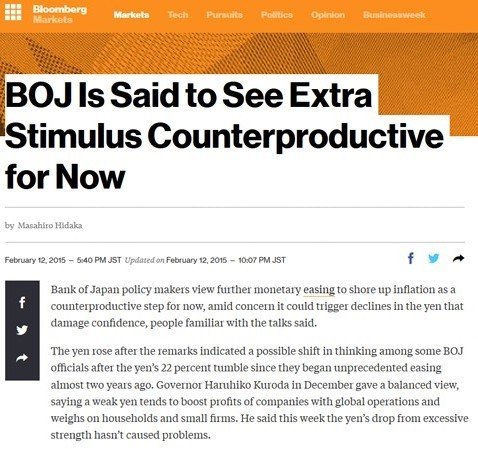
Because it is a long story, details are omitted herein, but it is suggested that the original title of this article had been “BOJ Said to See any Extra Stimulus Counterproductive for Now,” without “is” but instead “any” added.
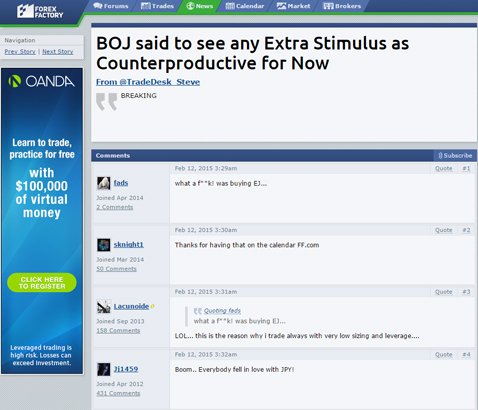
This is the trace left in “Forex Factory,” an overseas FX forum. It is written here as “BOJ said to see any Extra Stimulus Counterproductive for Now,” without “is” and with “any.”
The original title used the expression of “BOJ Said...,” which can be easily taken as an article showing the BOJ’s own view.
It is considered that more than one article by Masahiro Hidaka had their title altered after the article was published, adding the verb “be (is/are).”
This article has turned into rather an unusual one for “ZAi FX!” digging into English expressions at length.
However, please do not think it’s only a matter of a single verb, “be.” The USD/JPY market move could have been pretty different with or without it, and it is possible that the difference was intentionally manipulated. With “be” or without “be,” that is the question.
Research and text by: Minoru Iguchi, ZAi FX! Editor-in-Chief
Research support by: Masataka Shoji, ZAi FX! Editorial Department
Editing support and translation by: Erklaren Inc.




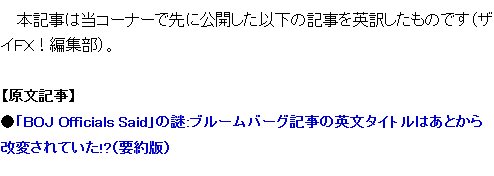
![ヒロセ通商[LION FX]](https://zaifx.ismcdn.jp/mwimgs/9/d/-/img_9de7d20e590bb2b4c8f599c6803c8972107100.gif)
![ゴールデンウェイ・ジャパン(旧FXトレード・フィナンシャル)[FXTF MT4]](/mwimgs/9/f/-/img_9f888c16a19c8addccf0c80c4796eca022145.gif)

![ヒロセ通商[LION FX]](/mwimgs/2/a/-/img_2a52600bd883437cd42323cdfe740fdd39661.gif)








株主:株式会社ダイヤモンド社(100%)
加入協会:一般社団法人日本暗号資産ビジネス協会(JCBA)